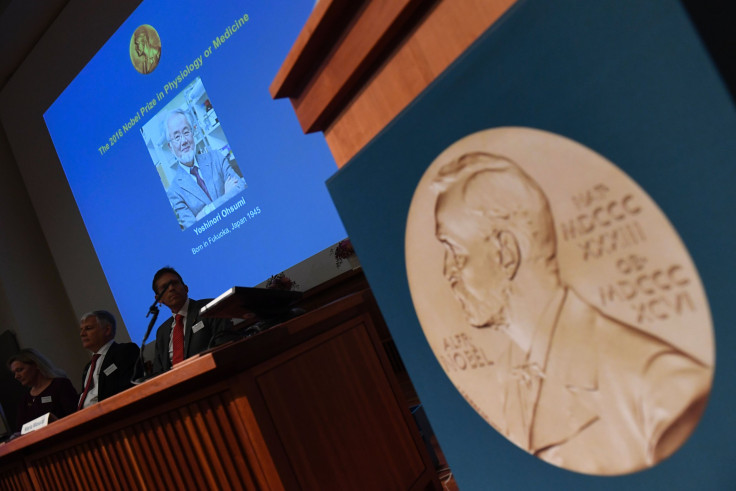Nobel 2016: Medicine Prize Awarded To Japan’s Yoshinori Ohsumi For Discovering Mechanisms Of Autophagy

Kicking off this year’s Nobel Prize announcements, the Nobel Assembly at Sweden’s Karolinska Institutet on Monday awarded the 2016 Nobel Prize in physiology or medicine to the Japanese cell biologist Yoshinori Ohsumi for his discoveries of mechanisms for “autophagy.”
BREAKING NEWS The 2016 #NobelPrize #Medicine awarded to Yoshinori Ohsumi @tokyotech_en ”for his discoveries of mechanisms for autophagy” pic.twitter.com/PDxWbSqoIX
— The Nobel Prize (@NobelPrize) October 3, 2016
Autophagy — a word derived from the Greek words auto, meaning “self”, and phagein , meaning “to eat” — is a fundamental process for degrading and recycling cellular components. Disruptions in the normal autophagic process have been linked to Parkinson’s disease, type 2 diabetes and other disorders among the elderly, while mutations in genes controlling autophagy can cause debilitating genetic diseases.
Ohsumi, who is the 23rd Nobel laureate born in Japan, identified 15 genes in yeast mutants essential for this process to take place.
Autophagy ”self eating” is a process for degrading and recycling cellular components #NobelPrize #Medicine pic.twitter.com/glNWLPjxHe
— The Nobel Prize (@NobelPrize) October 3, 2016
The results of this major breakthrough, which also proved that autophagy exists in yeast cells, were published in 1992.
“Ohsumi's discoveries led to a new paradigm in our understanding of how the cell recycles its content. His discoveries opened the path to understanding the fundamental importance of autophagy in many physiological processes, such as in the adaptation to starvation or response to infection,” the Nobel Assembly said in a statement. “Mutations in autophagy genes can cause disease, and the autophagic process is involved in several conditions including cancer and neurological disease.”
In 2015, the medicine Nobel went to William Campbell and Satoshi Satoshi Ōmura for their discoveries concerning “a novel therapy against infections caused by roundworm parasites,” and Youyou Tu, for her role in creating a drug to combat malaria.
The Nobel Prize in physics and chemistry will be announced tomorrow and day after respectively, while the peace and economics Nobel is scheduled to be announced on Oct. 7 and Oct. 10. The dates for the literature prize have not yet been revealed.
The Nobel Assembly at Karolinska Institutet — convened for the purpose of awarding the medicine prize — has 50 voting members and is composed of professors from the institute. Members of the Nobel Committee — its working body — are elected from among its members for a three-year term.
The other two science prizes are awarded by the Royal Swedish Academy of Sciences.
The sum awarded each year varies depending on investment value of Alfred Nobel’s initial 31 million kronor — approximately 1.7 billion Swedish kronor ($198 million) in current value — capital, which he stipulated should be invested in “safe securities” a year before his death back in 1895.
This year, each full Nobel Prize is worth 8 million Swedish kronor ($936,000).
© Copyright IBTimes 2024. All rights reserved.





















